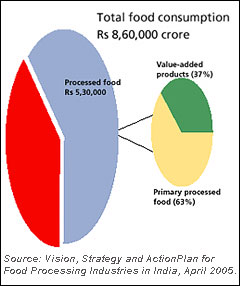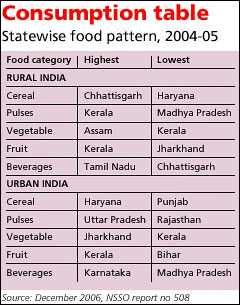Inedible India
Inedible India
 Eating habits, cooking habits, cuisines have changed, are changing, across the country, across social strata, across the rural-urban divide. And for anybody’s money, it isn’t a change to inspire confidence in the future of public health.
Eating habits, cooking habits, cuisines have changed, are changing, across the country, across social strata, across the rural-urban divide. And for anybody’s money, it isn’t a change to inspire confidence in the future of public health.
Sample this. Ria Ghosh, a 14 year old who lives in south Delhi’s Chittaranjan Park, doesn’t have the antipathy to eating that a lot of teenagers do, she likes to tuck in. On an average school day she has herbal tea and porridge, Quaker oats with milk to be precise, for breakfast. On a bright Tuesday in February, she followed this up with a hot dog and scraps from a friend’s lunch paratha and potato chilli at school, washed down with an iced tea from the canteen. At home she had rice with daal, and mutton and potato curry for both lunch and dinner. In-between snacks consisted of four bars of Snickers, an apple and some cake. And, of course, there was the ubiquitous chewing gum.
The same day, 35-year-old Vinod Kumar Jaiswal, a tabla teacher in nearby East of Kailash, had four pieces of bread with a double-egg omelette and milk with Bournvita for breakfast. For lunch, he had rice with fish curry, fried potatoes, beans and egg curry. After an evening snack of pakoras, he finished the day with chapatis and daal, a single-egg omelette, salad and papad. During the day, he had five cups of tea and two cups of coffee. Like Ria, he also had chocolate. “Five eggs a day are a must,” he says. He has fruits on alternate days.
A homemaker based in Chittaranjan Park is the archetype of an exasperated mother. Her 13-year-old son’s eating habits drives her nuts. “We have to buy a lot of junk food for him. He just refuses to have the normal rice-and-daal meal. He has cakes and biscuit in the morning, pizzas or Maggi at lunch and paratha at night. This he supplements with liberal doses of soft drinks,” she says. Recently, the family holidayed in Darjeeling,
staying in a forest bungalow where junk food was not available. The boy’s father had to trek into town a long way just to get junk food. Not that he is any better, she says. He doesn’t like vegetarian food. If there is no meat on the table, the dissatisfaction shows.
Awareness trap
There are people who are aware of the need to balance their diets. But that doesn’t necessarily help. A homemaker in Gurgaon sends her five-year-old daughter to school with Kellogs choco biscuits and a slice of cheese, believing these are better than the chips and assorted junk other kids eat. “We are allowed to eat junk food only on Wednesdays and Fridays,” says 13-year-old Mehak Paul, who lives in south Delhi’s Greater Kailash-I. On these days, she and her 10-year-old brother Mohak have instant noodles.
A lot of people who are under the illusion that they are eating healthy are not, actually. Prithi Pais, a fashion designer in Bangalore, tries to stick to a balanced diet. But convenience is also important in her hectic lifestyle. So, she’s forced to take recourse to the supermarket. Packaged food like pasta, cheese, biscuits, chocolates, fruit juices, packaged vegetables and curd are staples on her shopping list. But she avoids food rich in fats, especially the more deadly variety, transfats. Dipankar Ghosh and Chitralekha Basu in Kolkata have a similar story. Both are media persons. Ghosh is an art director with an English daily and Basu is a freelance journalist. She works during the day; his workday starts at 4 pm. The only home-cooked meal they have together during the week is breakfast, often comprising eggs, toast and cured meats. Given their schedules, eating out is rare, once in two months at best.
Dipankar Ghosh and Chitralekha Basu in Kolkata have a similar story. Both are media persons. Ghosh is an art director with an English daily and Basu is a freelance journalist. She works during the day; his workday starts at 4 pm. The only home-cooked meal they have together during the week is breakfast, often comprising eggs, toast and cured meats. Given their schedules, eating out is rare, once in two months at best.
The couple usually has two home-cooked meals a day. She skips lunch, and he skips dinner or makes do with a quick snack. “We try to follow a normal food habit but we don’t have time,” says Ghosh. Basu admits that sometimes they do end up buying soup concentrates or instant upma and other pre-cooked and packaged food, even though they know it’s not very healthy. They try to stick to healthy food. Veggies and fish, are a regular fixture. “We use very little oil and a lot of the food is just boiled or steamed and lightly sautéed,” says Ghosh.
While the couple is more aware of the difference between healthy and unhealthy foods, it doesn’t stop them from indulging in bad food habits. “We balance out our health food with junk food,” says Ghosh.
The balance is clearly shifting. As traditional, and usually more calibrated, cuisines take a beating, traditional skills, too, become obsolescent. When her husband was still working, Lahari Guha spent long hours in the kitchen, preparing every meal the family ate, served fresh. They didn’t own a fridge, so her husband would shop vegetables and fish daily.
Now, the 66-year-old widow only enters the kitchen when she wants to prepare a special dish or two for her son Rahul or 12-year-old granddaughter, Gandharbi. Her daughter-in-law, Manjari, takes care of the rest, aided by a fridge stocked with pre-cooked and instant foods. Inevitably, traditional Bengali cuisine faces stiff competition. Both her son and granddaughter love to eat out at least once or twice a month.
Not that eating home food is a guaranteed recipe for good gastronomic habits. Illusions play their role here as well. Manjul Mathur, a doctor in west Delhi’s Karol Bagh area, points out, for instance, that the widespread perception that refined oil is harmless has had deleterious health impacts. First, the jury is still out on these oils. Second, this perception has increased oil intake, which is unequivocally unhealthy.
Across the board It’s not just the rich who eat badly. In the resettlement colony in Madanpur Khadar, near the south Delhi-Haryana border, Suman Devi, whose husband earns Rs 3,500 per month as a mechanic, feeds her family of five bread, rusks or biscuits with tea for breakfast. Lunch is rice with daal or chapatis with vegetables. But her youngest son, six-year-old Prince, loves packaged food. Two or three packets of biscuits a day is normal. The children also save pocket money for namkeens and biscuits, says Suman. In the same area, 50-year-old Phulwati’s husband runs a small shop. Her children regularly pick up tidbits from local shops
It’s not just the rich who eat badly. In the resettlement colony in Madanpur Khadar, near the south Delhi-Haryana border, Suman Devi, whose husband earns Rs 3,500 per month as a mechanic, feeds her family of five bread, rusks or biscuits with tea for breakfast. Lunch is rice with daal or chapatis with vegetables. But her youngest son, six-year-old Prince, loves packaged food. Two or three packets of biscuits a day is normal. The children also save pocket money for namkeens and biscuits, says Suman. In the same area, 50-year-old Phulwati’s husband runs a small shop. Her children regularly pick up tidbits from local shops







